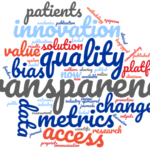ORCID is part of the wider digital infrastructure needed for researchers to share information on a global scale. ORCID enables transparent and trustworthy connections between researchers, their contributions, and affiliations by providing an identifier for individuals to use with their name as they engage in research, scholarship and innovation activities. The Open Pharma community is striving to drive fast and transparent medical publishing and is encouraging pharma companies to use their influence to achieve this.
Over the past 2 years, ORCID has collaborated with Open Pharma to demonstrate the benefits to researchers in pharma companies of registering for and using an ORCID iD.
Together, we have identified several potential benefits for researchers employed in the pharma sector if their companies integrated with the ORCID member Application Programming Interface (API), which allows other systems and applications to connect to the ORCID Registry of iDs. These benefits include:
- faster manuscript submissions to publishers
- improved reporting of research outputs
- increased efficiency for external author partners
- opportunities to streamline disclosure/conflict of interest information
- open science leadership.
Although pharma researchers won’t realize the full benefit of having an ORCID iD if their company has not integrated with ORCID, many of them have registered for ORCID iDs. An increasing number of pharma researchers now use an iD when submitting manuscripts for publication, because most major publishers request or, in some cases, require them to do so. This allows them to distinguish themselves from other authors – including those in academia – who have the same or similar names, and ensures that they are correctly connected with their own publications. It also enables their ORCID record to be automatically updated with the DOI for their article when it is published.
Across the top pharma companies, there has been a steady increase in the total number of ORCID iDs linked with an institutional domain between June 2017 and June 2019. The greatest adoption has been observed by GSK Vaccines who ran a pilot ORCID project between August and December 2017, highlighting the importance of education on the benefits of ORCID.
Based on a sample of ORCID iD records of individuals who have added an affiliation with one of several selected organizations, we estimate that:
- 89% had shared their ORCID iD with an organization (e.g. publisher, funder, employer) through an ORCID research workflow integration
- 62% had works connected to their record
- 12% had funding information connected to their record
- 2% had peer review activities connected to their record.
ORCID and Open Pharma plan to build on these positive trends, both to improve the technical workflow in pharma research management systems and to increase awareness among researchers and medical publication professionals working in pharma companies. The next phase of our collaboration will focus on identifying systems in the pharma community that are interested in implementing ORCID best practice workflows and allowing the synchronization of research information through permission-based authentication.
Educational materials to support the adoption of ORCID in pharma can be found at https://openpharma.blog/wp-content/uploads/2018/10/Open-Pharma-ORCID-infographic_GSK-case-study.pdf. Look out for more information in future blog posts and, if you are interested in finding out more, please contact community@orcid.org or oxfordproject@pharmagenesis.com.
ORCID have been collaborating with the Open Pharma team on various outreach activities over the last two years. This post is jointly authored by former Engagement Director, Matt Buys at ORCID, and Paul Farrow, Group Communications Director and Sarah Sabir, Associate Medical Writer at Oxford PharmaGenesis.

![A person is submerged in a mangrove. Their hands are raised above the water.]]](https://www.openpharma.blog/wp-content/uploads/2025/01/pexels-edurawpro-21588525-150x100.jpg)




